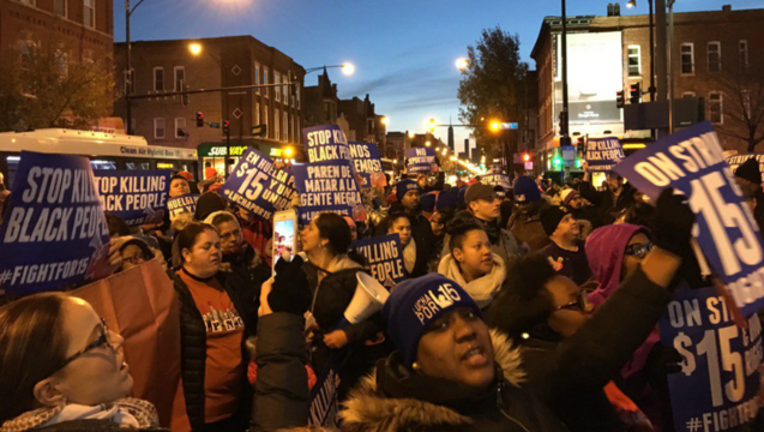Illinois Dems aim high with minimum wage proposals

(Joanie Lum)
SPRINGFIELD, Ill. (AP) - Amid a national push by unions and worker advocates for a $15 minimum wage, Illinois Democrats hope to pass an ambitious hike during the spring legislative session, despite a warning from Republican Gov. Bruce Rauner that he opposes an increase of any kind.
The proposal would lift the state's minimum wage from its current $8.25 to $15 over the next five years, a more accelerated leap than previous adjustments in Illinois. It also would constitute a larger jump than increases toward $15 approved last year in New York and California, where the rates had been $9 and $10, respectively.
But, as with previous efforts in Illinois, the measure is likely to be tied up in the state's electoral politics.
Sponsors of the legislation acknowledge Rauner's opposition but have signaled they want to force him to act on the measure ahead of next year's gubernatorial election, in which he already faces half a dozen Democratic challengers.
"We will get a really good opportunity to see where the governor stands," said Rep. Will Guzzardi, a Chicago Democrat sponsoring the wage bill in the House. "Does he side with the 2.3 million people in this state who need a raise now or does he side with the big corporations?"
In the past, Rauner has said he supported minor increases in the minimum wage. But he told the audience at a business forum on April 13 that requiring employers to raise pay is out of the question.
"That's not gonna happen," Rauner said. "Companies will just leave."
Democrats say they have considerable support for the $15-per-hour measure in the House, and expect a floor vote in May. The Senate is also considering two minimum wage bills, one similar to Guzzardi's and a less ambitious one that would raise the wage to $11 by 2021.
In 2014, Democrats placed an advisory referendum on the Illinois ballot asking voters whether they supported a minimum wage increase in an effort to motivate their base to go to the polls. The referendum secured 67% of the vote in the same election that Rauner won his first term in office. During the campaign, Rauner was criticized by his rival, former Gov. Pat Quinn, for statements supporting a reduction of the minimum wage.
Illinois has raised its minimum wage above the federal floor, currently $7.25 per hour, twice in recent history - first in 2003 and again in 2006 to $8.25, where it's remained since 2011. That leaves Illinois with a lower rate than 20 others nationwide, but above every state it borders.
Business leaders claim increasing the rate puts Illinois at a competitive disadvantage, driving companies across state lines or forcing them to reduce staff. Labor unions and other allies of the national "Fight for $15" campaign contend raising the minimum wage boosts the economy by putting more money into pockets of low-wage workers, decreasing reliance on government assistance.
Advocates say anything less than $15 falls far short of the cost of living for millions of Illinoisans. They point to research including a 2016 report from the University of Illinois that shows at least 34 percent of Illinois workers earn less than $15 an hour, many of them while helping to support a family.
The report projects an increase to $15 would result in just a 0.78 percent employment decline while yielding an extra $2.4 billion in tax revenue.
Robert Bruno, a professor of labor relations at the university who co-authored the report, said research on previous increases indicates companies are able to recoup additional labor costs by raising prices a few cents on the dollar and benefit from enhanced worker productivity and purchasing power.
Some business organizations, including the Illinois Chamber of Commerce, oppose any increase above federal levels. Others, like the Illinois Restaurant Association, are willing to consider a more incremental adjustment - something some economics experts also recommend, warning against potential job loss resulting from more substantial leaps.
Sen. Kimberly Lightford of Maywood, the Democrat sponsoring both Senate proposals, has been advocating for a higher rate since 1999 when she first proposed what became Illinois' 2003 increase. She said if the federal minimum had risen with inflation since its peak in 1968, it would be $11 today.
"I cannot sit back and allow millions of working people to receive no wage increase at all because it could not be the $15," she said.
The bills are HB198, SB1738 and SB2.

